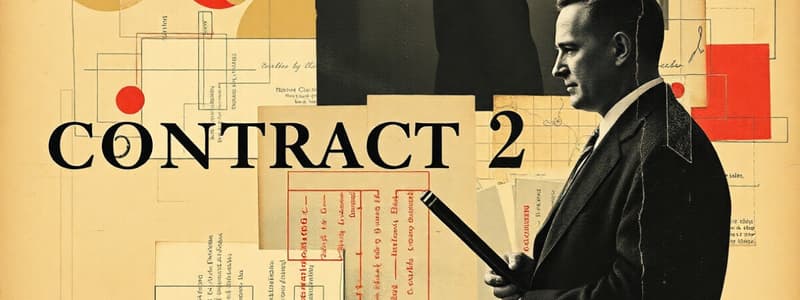Podcast
Questions and Answers
What constitutes an enforceable contract in the Zehmer case?
What constitutes an enforceable contract in the Zehmer case?
- Verbal offers are insufficient for enforceability.
- A reasonable person must believe the offer was made in good faith. (correct)
- A joke claim is always enforceable.
- All parties must understand the financial implications.
In the context of offers, what is an invitation for an offer?
In the context of offers, what is an invitation for an offer?
- A binding agreement subject to negotiation.
- A potential expression of interest that does not create obligations. (correct)
- An informal discussion about possible terms.
- A clear proposal to enter a contract.
According to U.C.C. Article 2, how can a contract be formed?
According to U.C.C. Article 2, how can a contract be formed?
- Through explicit written agreements only.
- Via any manner of assent, regardless of form. (correct)
- Only when both parties meet face-to-face.
- With notarized documents to validate the agreement.
What must advertisements contain to be considered legally binding offers?
What must advertisements contain to be considered legally binding offers?
In the case of Morales v. Sun Constructors, Inc., what was the court's decision regarding the arbitration clause?
In the case of Morales v. Sun Constructors, Inc., what was the court's decision regarding the arbitration clause?
What happens to an offer once it is expressly rejected by the offeree?
What happens to an offer once it is expressly rejected by the offeree?
What defines mutual assent in contract law?
What defines mutual assent in contract law?
How does the law view preliminary negotiations in forming a contract?
How does the law view preliminary negotiations in forming a contract?
What does RST 2d of Contracts § 20 state regarding the existence of a contract?
What does RST 2d of Contracts § 20 state regarding the existence of a contract?
In the context of misunderstanding, which scenario does NOT lead to a contract under RST 2d of Contracts § 20?
In the context of misunderstanding, which scenario does NOT lead to a contract under RST 2d of Contracts § 20?
What is a key requirement for terms of a contract according to RST 2d of Contracts § 33?
What is a key requirement for terms of a contract according to RST 2d of Contracts § 33?
In Varney v. Ditmars, what made the contract invalid?
In Varney v. Ditmars, what made the contract invalid?
Which statement best reflects the traditional law regarding contract clarity?
Which statement best reflects the traditional law regarding contract clarity?
Which of the following scenarios can lead to a contract despite differing meanings?
Which of the following scenarios can lead to a contract despite differing meanings?
What is true regarding indefinite and incomplete terms in contracts?
What is true regarding indefinite and incomplete terms in contracts?
Under RST 2d of Contracts, when is it determined that there is a contract despite differing meanings?
Under RST 2d of Contracts, when is it determined that there is a contract despite differing meanings?
What principle do courts consider when determining if a contract is unenforceable due to lack of certainty?
What principle do courts consider when determining if a contract is unenforceable due to lack of certainty?
Which of the following describes relational contracts?
Which of the following describes relational contracts?
Under U.C.C.§ 2-204, what condition allows gaps in a contract to be filled?
Under U.C.C.§ 2-204, what condition allows gaps in a contract to be filled?
What does the default rule in U.C.C.§ 2-306 state regarding quantity?
What does the default rule in U.C.C.§ 2-306 state regarding quantity?
What does a postponed agreement imply?
What does a postponed agreement imply?
In the case of Walker v. Keith, what was the primary legal issue?
In the case of Walker v. Keith, what was the primary legal issue?
What type of agreements does U.C.C.§ 2-305 address?
What type of agreements does U.C.C.§ 2-305 address?
What is a common characteristic of long-term agreements?
What is a common characteristic of long-term agreements?
What action may a court take if it finds a contract to be unconscionable?
What action may a court take if it finds a contract to be unconscionable?
Which type of unconscionability involves difficult-to-interpret terms hidden in fine print?
Which type of unconscionability involves difficult-to-interpret terms hidden in fine print?
In the context of mutual mistake, which criterion must be met for a contract to be deemed voidable?
In the context of mutual mistake, which criterion must be met for a contract to be deemed voidable?
What is considered procedural unconscionability in a contract context?
What is considered procedural unconscionability in a contract context?
According to the Restatement of Contracts, when can a contract be voided for mistake?
According to the Restatement of Contracts, when can a contract be voided for mistake?
What scenario exemplifies substantive unconscionability based on high-interest payday loans?
What scenario exemplifies substantive unconscionability based on high-interest payday loans?
Which aspect of a contract does not typically lead to finding unconscionability?
Which aspect of a contract does not typically lead to finding unconscionability?
In the case of Williams v. Walker-Thomas Furniture Company, which type of unconscionability was primarily involved?
In the case of Williams v. Walker-Thomas Furniture Company, which type of unconscionability was primarily involved?
What type of damages was Baseball awarded due to their inability to prove substantial certainty regarding the amount owed?
What type of damages was Baseball awarded due to their inability to prove substantial certainty regarding the amount owed?
What must liquidated damages be in order to be enforceable according to RST 2d of Contracts § 356?
What must liquidated damages be in order to be enforceable according to RST 2d of Contracts § 356?
In Dobson Bay Club v. La Sonrisa, what did the court decide regarding the late fee claimed by the defendant?
In Dobson Bay Club v. La Sonrisa, what did the court decide regarding the late fee claimed by the defendant?
Under U.C.C. § 2-718, when can damages for breach be liquidated?
Under U.C.C. § 2-718, when can damages for breach be liquidated?
What is the primary restriction placed on liquidated damages agreements according to the content?
What is the primary restriction placed on liquidated damages agreements according to the content?
What is the formula for calculating a buyer's damages if the seller fails to deliver?
What is the formula for calculating a buyer's damages if the seller fails to deliver?
Where is the market price determined when calculating damages?
Where is the market price determined when calculating damages?
What is the basis for assessing damages for breach of warranty?
What is the basis for assessing damages for breach of warranty?
What remedy can a seller NOT take if the buyer improperly rejects the goods?
What remedy can a seller NOT take if the buyer improperly rejects the goods?
What are the seller's damages calculated from in the event of a breach by the buyer according to the U.C.C. § 2-706?
What are the seller's damages calculated from in the event of a breach by the buyer according to the U.C.C. § 2-706?
If a buyer fails to pay on time, which of the following actions may NOT be taken by the seller?
If a buyer fails to pay on time, which of the following actions may NOT be taken by the seller?
In cases where special circumstances are present, what can influence the measure of damages for a breach of warranty?
In cases where special circumstances are present, what can influence the measure of damages for a breach of warranty?
What may the seller do in the case of a complete breach of the contract by the buyer?
What may the seller do in the case of a complete breach of the contract by the buyer?
Flashcards
Offer
Offer
A statement or action that shows a willingness to be bound by specific terms if the other party agrees.
Advertisement as Offer
Advertisement as Offer
An advertisement is generally not an offer but an invitation to negotiate or an invitation to make an offer.
Preliminary Negotiations
Preliminary Negotiations
A manifestation of willingness to enter into an agreement is not an offer if the person to whom it is addressed knows or has reason to know that the person making it does not intend to conclude the agreement until he has made a further manifestation of assent.
Rejection
Rejection
Signup and view all the flashcards
Mutual Assent
Mutual Assent
Signup and view all the flashcards
Offer Destroyed by Rejection
Offer Destroyed by Rejection
Signup and view all the flashcards
Outward Expression of Assent
Outward Expression of Assent
Signup and view all the flashcards
Objective Theory of Contracts
Objective Theory of Contracts
Signup and view all the flashcards
Mutual Misunderstanding
Mutual Misunderstanding
Signup and view all the flashcards
Subjective Approach in Contracts
Subjective Approach in Contracts
Signup and view all the flashcards
RST 2d of Contracts § 20 (1)(a)
RST 2d of Contracts § 20 (1)(a)
Signup and view all the flashcards
RST 2d of Contracts § 20 (1)(b)
RST 2d of Contracts § 20 (1)(b)
Signup and view all the flashcards
RST 2d of Contracts § 20 (2)
RST 2d of Contracts § 20 (2)
Signup and view all the flashcards
RST 2d of Contracts § 20 (2)(b)
RST 2d of Contracts § 20 (2)(b)
Signup and view all the flashcards
RST 2d of Contracts § 33: Indefiniteness
RST 2d of Contracts § 33: Indefiniteness
Signup and view all the flashcards
Varney v. Ditmars
Varney v. Ditmars
Signup and view all the flashcards
Certainty in Contracts
Certainty in Contracts
Signup and view all the flashcards
Long-Term Agreements
Long-Term Agreements
Signup and view all the flashcards
Relational Contracts
Relational Contracts
Signup and view all the flashcards
Gap Fillers (U.C.C. § 2-204)
Gap Fillers (U.C.C. § 2-204)
Signup and view all the flashcards
Default Rule for Quantity (U.C.C. § 2-306)
Default Rule for Quantity (U.C.C. § 2-306)
Signup and view all the flashcards
Postponed Agreement
Postponed Agreement
Signup and view all the flashcards
Undetermined Price (U.C.C. § 2-305)
Undetermined Price (U.C.C. § 2-305)
Signup and view all the flashcards
Traditional Law on Agreements to Agree
Traditional Law on Agreements to Agree
Signup and view all the flashcards
Liquidated Damages
Liquidated Damages
Signup and view all the flashcards
Liquidated Damages vs. Penalty
Liquidated Damages vs. Penalty
Signup and view all the flashcards
Reasonableness of Liquidated Damages
Reasonableness of Liquidated Damages
Signup and view all the flashcards
Unenforceable Liquidated Damages
Unenforceable Liquidated Damages
Signup and view all the flashcards
Liquidated Damages under UCC
Liquidated Damages under UCC
Signup and view all the flashcards
Unconscionable Contract
Unconscionable Contract
Signup and view all the flashcards
Procedural Unconscionability
Procedural Unconscionability
Signup and view all the flashcards
Substantive Unconscionability
Substantive Unconscionability
Signup and view all the flashcards
Arbitration Agreement
Arbitration Agreement
Signup and view all the flashcards
Mistaken Factual Assumption
Mistaken Factual Assumption
Signup and view all the flashcards
Mutual/Bilateral Mistake
Mutual/Bilateral Mistake
Signup and view all the flashcards
Risk of Mistake
Risk of Mistake
Signup and view all the flashcards
Restitution When Contrary to Public Interest
Restitution When Contrary to Public Interest
Signup and view all the flashcards
Buyer's Market Damages
Buyer's Market Damages
Signup and view all the flashcards
Market Price in Buyer's Damages?
Market Price in Buyer's Damages?
Signup and view all the flashcards
Buyer's Damages for Warranty Breach
Buyer's Damages for Warranty Breach
Signup and view all the flashcards
Seller Remedies for Buyer Breach
Seller Remedies for Buyer Breach
Signup and view all the flashcards
Seller's Resale Damages
Seller's Resale Damages
Signup and view all the flashcards
Seller Remedies for Buyer Breach
Seller Remedies for Buyer Breach
Signup and view all the flashcards
Seller Remedies for Buyer Breach
Seller Remedies for Buyer Breach
Signup and view all the flashcards
Seller Remedies for Buyer Breach
Seller Remedies for Buyer Breach
Signup and view all the flashcards
Study Notes
Contracts Outline Fall 2024
- Offer + Acceptance + Definiteness + Consideration = Contract
- Steps to Follow:
- Determine Applicable Law (UCC or Common Law)
- Mutual Assent (Offer & Acceptance)
- Was the mode of acceptance appropriate?
- Consideration
- Contract formed?
- Was there Promissory Estoppel?
- Terms of Agreement (Interpretation & Performance)
- Breach of Contract
- Defenses for Breach: Duress, Undue Influence, Mistake, Capacity, Public Policy, Statute
- Ambiguity in Written Agreement (Parol Evidence, Industry Customs, Good Faith)
- Excuse for Breach: Impracticability/Impossibility, Condition Precedent, Frustration of Purpose, Anticipatory Repudiation
- Remedies for Aggrieved Party
- Specific Performance
- Liquidated Damages
- Mutual Assent:
- Objective Theory: A reasonable person would believe there was an offer and acceptance based on outward acts.
- Subjective Theory: The parties' actual intent matters in situations where reasonable person would differ.
- Lucy v. Zehmer: A court can enforce a contract even if one party subjectively intended it as a joke.
- Offer:
- A proposal showing intent for a contract to form if accepted by another.
- An invitation to an offer is not an offer itself.
- Rejection:
- Express Rejection: Offeree explicitly rejects the offer
- Implied Rejection: Offeree proposes a counteroffer
- Revocation:
- An offeror can revoke an offer anytime before acceptance
- Direct or indirect revocation
- Lapse:
- Offer lapses after a reasonable period of time without acceptance
- Death (or Incapacity):
- Terminates the offeree's power to accept the offer
- Preserving the Offer:
- Option Contract: A promise to keep an offer open for a specified time in exchange for consideration
- Firm Offer (UCC): A written and signed offer by a merchant to keep an offer open for a time, binding without consideration.
- Acceptance:
- Offeree's assent to the offeror's terms in the prescribed or implied manner.
- Offeror dictates the manner of acceptance
- Bilateral Contract: Exchange of promises (mutual assent)
- Unilateral Contract: Acceptance through performance
- Acceptance by Silence: It usually does not constitute acceptance unless specifically agreed upon or other circumstances.
- Effectiveness of Acceptance:
- Mailbox rule: Acceptance is effective upon dispatch (not receipt).
- Acceptance by performance or notification
- Imperfect Acceptances:
- Mirror image rule: Acceptance must mirror the offer exactly.
- Immateriality exception: Minor changes to the acceptance won't invalidate it
- Modification exception: Modification in acceptance permitted by reasonable person
- Deficient Agreements:
- Lack of complete agreement on all material terms
- Mistakes, misunderstanding, and ambiguities
- Consideration:
- Something of value exchanged between parties in a contract; essential to differentiate from gifts or gratuitous promises.
- Bargained for exchange: Both parties exchange something
- Illusory Promise: One party's promise to do something that isn't really a commitment (conditional or optional)
- Modifications:
- Requirement of consideration for modifications for contracts
- Unconscionability:
- Procedural Unconscionability: Unfair contract formation process, lack of choice or understanding.
- Substantive Unconscionability: Unfair terms in a contract that are excessively one-sided.
- Statute of Frauds:
- Some contracts must be in writing to be enforceable (e.g., contracts for sale of land, contracts that by its terms cannot possibly be performed within one year.)
- Public Policy:
- Agreements enforceable only if they don't contradict public policies.
Studying That Suits You
Use AI to generate personalized quizzes and flashcards to suit your learning preferences.




